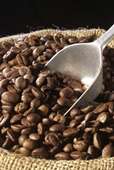First scientific method to authenticate world's costliest coffee

The world's most expensive coffee can cost $80 a cup, and scientists now are reporting development of the first way to verify authenticity of this crème de la crème, the beans of which come from the feces of a Southeast Asian animal called a palm civet. Their study appears in ACS' Journal of Agricultural and Food Chemistry.
Eiichiro Fukusaki and colleagues point out that Kopi Luwak (Indonesian for "civet coffee") is the world's costliest coffee, often fetching $150-$200 per pound. Palm civets eat coffee berries, digest the soft fruit surrounding the bean and excrete the bean. Workers retrieve the coffee beans and clean, ferment and roast them. The price makes Kopi Luwak a tempting target for fraud, with ordinary coffee sold as Kopi Luwak or real Kopi Luwak adulterated with cheap beans. Fukusaki and his team decided to find a way to scientifically identify the real deal.
They describe identifying unique chemical fingerprints that can be used to identify authentic Kopi Luwak and distinguish pure Kopi Luwak from Kopi Luwak that has been mixed with cheaper coffee. "This is the first report to address the selection and successful validation of discriminant markers for the authentication of Kopi Luwak," the scientists state.

The article is titled "Selection of Discriminant Markers for Authentication of Asian Palm Civet Coffee (Kopi Luwak): A Metabolomics Approach."
More information: Selection of Discriminant Markers for Authentication of Asian Palm Civet Coffee (Kopi Luwak): A Metabolomics Approach, J. Agric. Food Chem., 2013, 61 (33), pp 7994–8001. DOI: 10.1021/jf401819s
Abstract
Kopi Luwak, an exotic Indonesian coffee, is made from coffee berries that have been eaten by the Asian palm civet (Paradoxurus hermaphroditus). Despite being known as the world's most expensive coffee, there is no reliable, standardized method for determining its authenticity. GC-MS-based multimarker profiling was employed to explore significant metabolites as discriminant markers for authentication. Extracts of 21 coffee beans (Coffea arabica and Coffea canephora) from three cultivation areas were analyzed and subjected to multivariate analyses, principal component analysis, and orthogonal projection to latent structures discriminant analysis. Citric acid, malic acid, and the inositol/pyroglutamic acid ratio were selected for further verification by evaluating their differentiating abilities against various commercial coffee products. The markers demonstrated potential application in the differentiation of original, fake Kopi Luwak, regular coffee, and coffee blend samples with 50 wt % Kopi Luwak content. This is the first report to address the selection and successful validation of discriminant markers for the authentication of Kopi Luwak.
Journal information: Journal of Agricultural and Food Chemistry
Provided by American Chemical Society




















